Teamwork, Innovation, and Performance: A Comprehensive Report
VerifiedAdded on 2020/05/28
|13
|3709
|262
Report
AI Summary
This report presents an annotated bibliography exploring the multifaceted aspects of teamwork within organizational contexts. It synthesizes key research findings from several studies, including Fay et al.'s work on teamwork and innovation, de Jong et al.'s meta-analysis on trust and team performance, and Howard et al.'s research on reward strategies and productivity. The report also examines the impact of teamwork on employee burnout, as investigated by García-Campayo et al., and highlights the importance of soft skills in team dynamics, as discussed by Gibert et al. Furthermore, it delves into the significance of diversity and interpersonal skills in collaborative research teams, as outlined by Cheruvelil et al., and explores the development of cross-cultural teamwork through virtual platforms, as presented by Duus and Cooray. The report offers insights into how teamwork affects innovation, performance, and employee well-being. This report is available on Desklib and can be used to enhance your understanding of teamwork and its impact on organizational success.
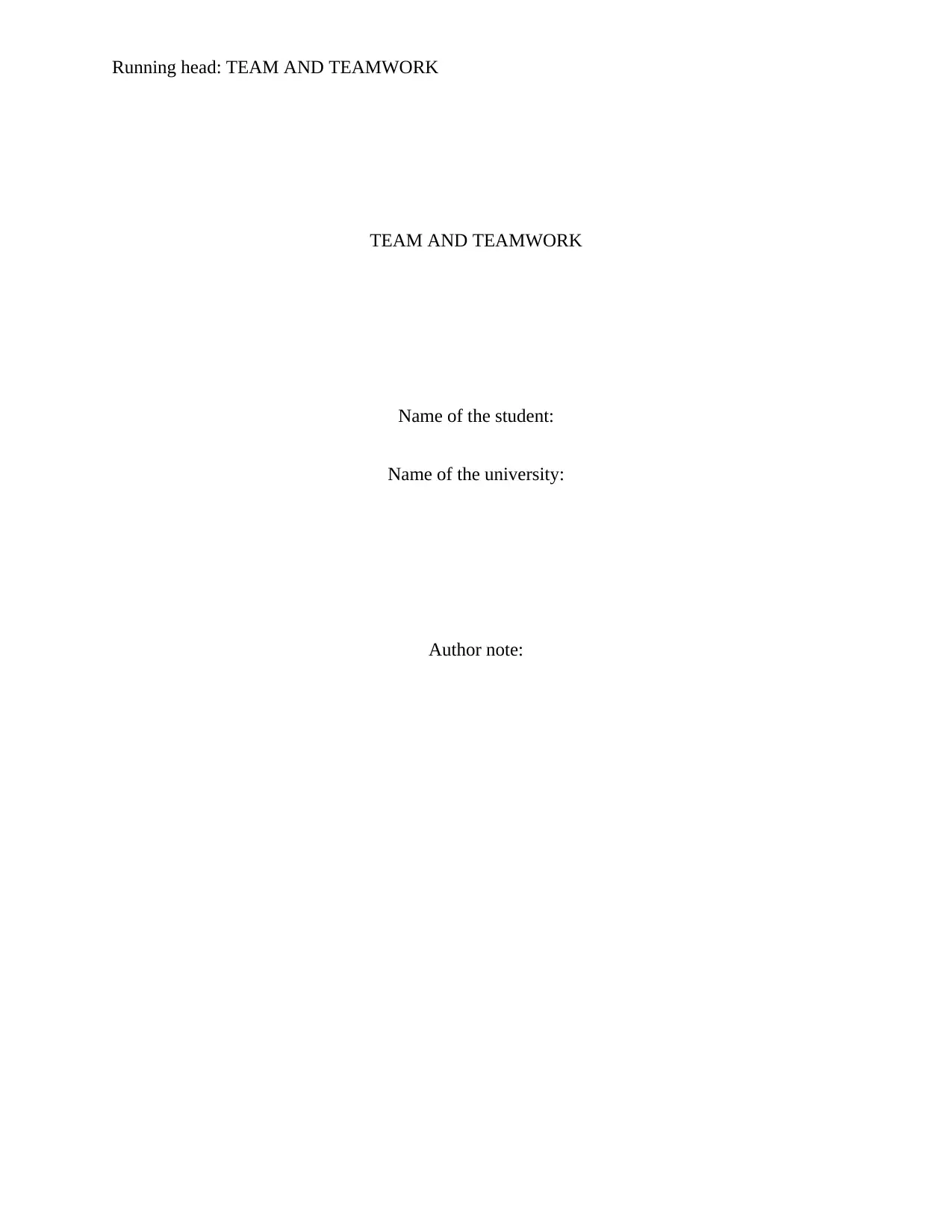
Running head: TEAM AND TEAMWORK
TEAM AND TEAMWORK
Name of the student:
Name of the university:
Author note:
TEAM AND TEAMWORK
Name of the student:
Name of the university:
Author note:
Paraphrase This Document
Need a fresh take? Get an instant paraphrase of this document with our AI Paraphraser
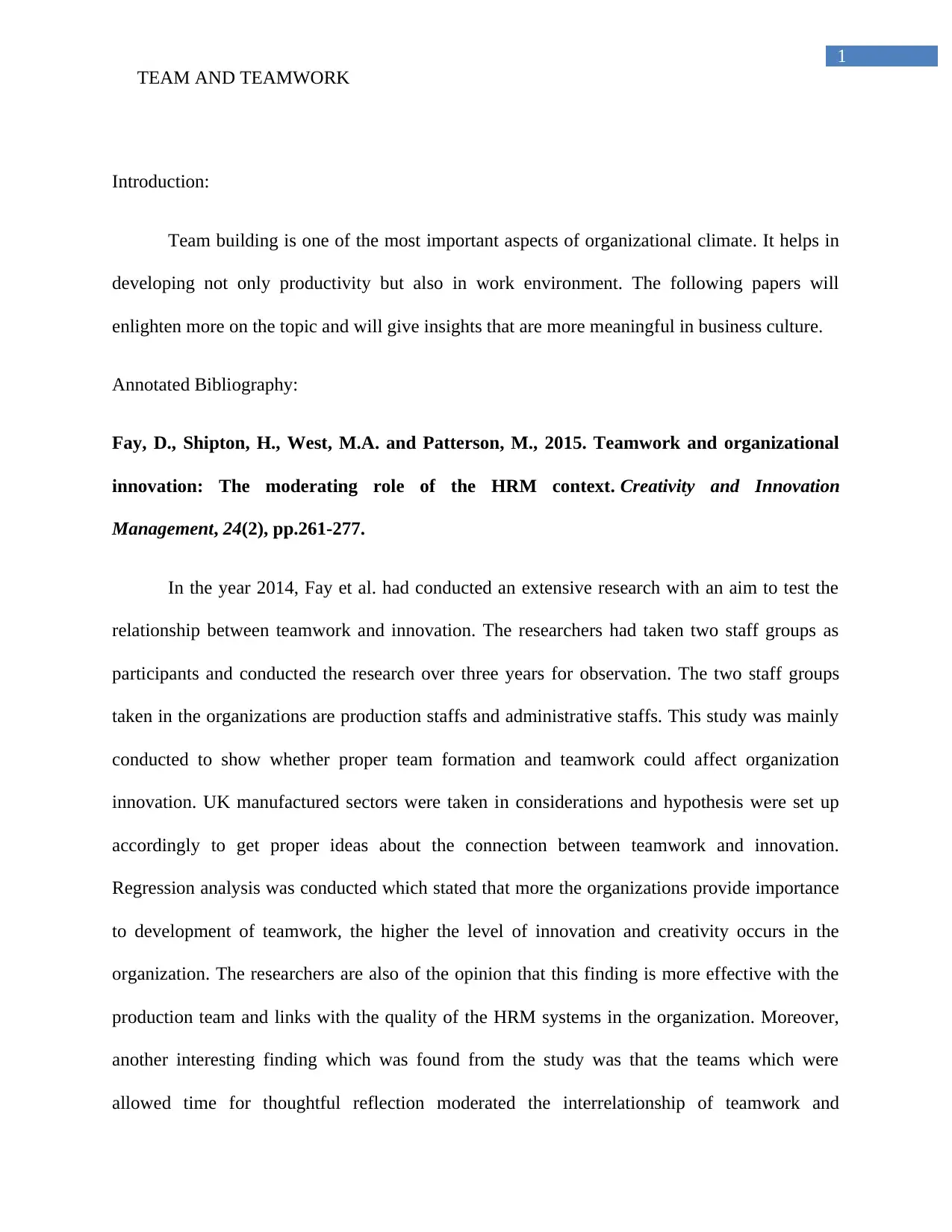
1
TEAM AND TEAMWORK
Introduction:
Team building is one of the most important aspects of organizational climate. It helps in
developing not only productivity but also in work environment. The following papers will
enlighten more on the topic and will give insights that are more meaningful in business culture.
Annotated Bibliography:
Fay, D., Shipton, H., West, M.A. and Patterson, M., 2015. Teamwork and organizational
innovation: The moderating role of the HRM context. Creativity and Innovation
Management, 24(2), pp.261-277.
In the year 2014, Fay et al. had conducted an extensive research with an aim to test the
relationship between teamwork and innovation. The researchers had taken two staff groups as
participants and conducted the research over three years for observation. The two staff groups
taken in the organizations are production staffs and administrative staffs. This study was mainly
conducted to show whether proper team formation and teamwork could affect organization
innovation. UK manufactured sectors were taken in considerations and hypothesis were set up
accordingly to get proper ideas about the connection between teamwork and innovation.
Regression analysis was conducted which stated that more the organizations provide importance
to development of teamwork, the higher the level of innovation and creativity occurs in the
organization. The researchers are also of the opinion that this finding is more effective with the
production team and links with the quality of the HRM systems in the organization. Moreover,
another interesting finding which was found from the study was that the teams which were
allowed time for thoughtful reflection moderated the interrelationship of teamwork and
TEAM AND TEAMWORK
Introduction:
Team building is one of the most important aspects of organizational climate. It helps in
developing not only productivity but also in work environment. The following papers will
enlighten more on the topic and will give insights that are more meaningful in business culture.
Annotated Bibliography:
Fay, D., Shipton, H., West, M.A. and Patterson, M., 2015. Teamwork and organizational
innovation: The moderating role of the HRM context. Creativity and Innovation
Management, 24(2), pp.261-277.
In the year 2014, Fay et al. had conducted an extensive research with an aim to test the
relationship between teamwork and innovation. The researchers had taken two staff groups as
participants and conducted the research over three years for observation. The two staff groups
taken in the organizations are production staffs and administrative staffs. This study was mainly
conducted to show whether proper team formation and teamwork could affect organization
innovation. UK manufactured sectors were taken in considerations and hypothesis were set up
accordingly to get proper ideas about the connection between teamwork and innovation.
Regression analysis was conducted which stated that more the organizations provide importance
to development of teamwork, the higher the level of innovation and creativity occurs in the
organization. The researchers are also of the opinion that this finding is more effective with the
production team and links with the quality of the HRM systems in the organization. Moreover,
another interesting finding which was found from the study was that the teams which were
allowed time for thoughtful reflection moderated the interrelationship of teamwork and
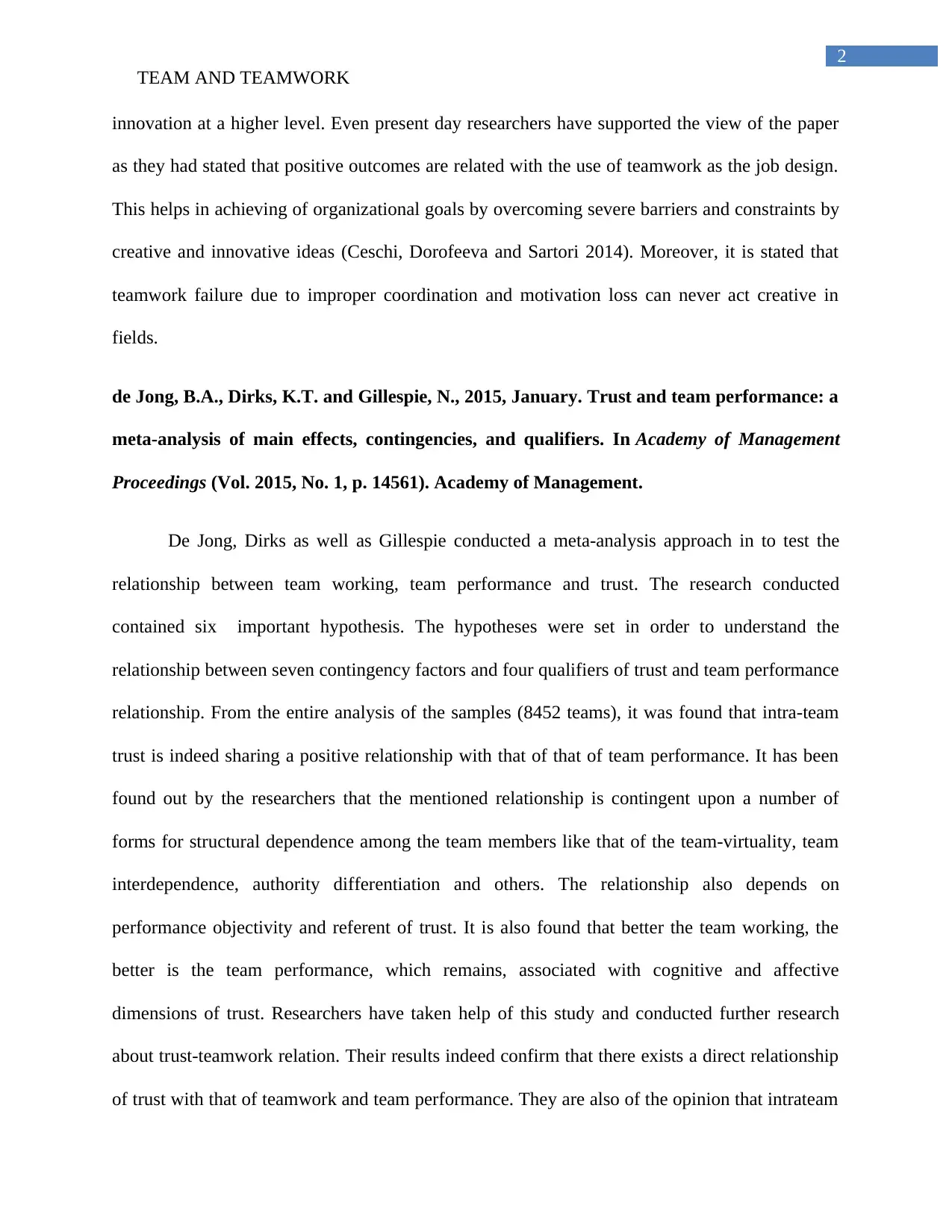
2
TEAM AND TEAMWORK
innovation at a higher level. Even present day researchers have supported the view of the paper
as they had stated that positive outcomes are related with the use of teamwork as the job design.
This helps in achieving of organizational goals by overcoming severe barriers and constraints by
creative and innovative ideas (Ceschi, Dorofeeva and Sartori 2014). Moreover, it is stated that
teamwork failure due to improper coordination and motivation loss can never act creative in
fields.
de Jong, B.A., Dirks, K.T. and Gillespie, N., 2015, January. Trust and team performance: a
meta-analysis of main effects, contingencies, and qualifiers. In Academy of Management
Proceedings (Vol. 2015, No. 1, p. 14561). Academy of Management.
De Jong, Dirks as well as Gillespie conducted a meta-analysis approach in to test the
relationship between team working, team performance and trust. The research conducted
contained six important hypothesis. The hypotheses were set in order to understand the
relationship between seven contingency factors and four qualifiers of trust and team performance
relationship. From the entire analysis of the samples (8452 teams), it was found that intra-team
trust is indeed sharing a positive relationship with that of that of team performance. It has been
found out by the researchers that the mentioned relationship is contingent upon a number of
forms for structural dependence among the team members like that of the team-virtuality, team
interdependence, authority differentiation and others. The relationship also depends on
performance objectivity and referent of trust. It is also found that better the team working, the
better is the team performance, which remains, associated with cognitive and affective
dimensions of trust. Researchers have taken help of this study and conducted further research
about trust-teamwork relation. Their results indeed confirm that there exists a direct relationship
of trust with that of teamwork and team performance. They are also of the opinion that intrateam
TEAM AND TEAMWORK
innovation at a higher level. Even present day researchers have supported the view of the paper
as they had stated that positive outcomes are related with the use of teamwork as the job design.
This helps in achieving of organizational goals by overcoming severe barriers and constraints by
creative and innovative ideas (Ceschi, Dorofeeva and Sartori 2014). Moreover, it is stated that
teamwork failure due to improper coordination and motivation loss can never act creative in
fields.
de Jong, B.A., Dirks, K.T. and Gillespie, N., 2015, January. Trust and team performance: a
meta-analysis of main effects, contingencies, and qualifiers. In Academy of Management
Proceedings (Vol. 2015, No. 1, p. 14561). Academy of Management.
De Jong, Dirks as well as Gillespie conducted a meta-analysis approach in to test the
relationship between team working, team performance and trust. The research conducted
contained six important hypothesis. The hypotheses were set in order to understand the
relationship between seven contingency factors and four qualifiers of trust and team performance
relationship. From the entire analysis of the samples (8452 teams), it was found that intra-team
trust is indeed sharing a positive relationship with that of that of team performance. It has been
found out by the researchers that the mentioned relationship is contingent upon a number of
forms for structural dependence among the team members like that of the team-virtuality, team
interdependence, authority differentiation and others. The relationship also depends on
performance objectivity and referent of trust. It is also found that better the team working, the
better is the team performance, which remains, associated with cognitive and affective
dimensions of trust. Researchers have taken help of this study and conducted further research
about trust-teamwork relation. Their results indeed confirm that there exists a direct relationship
of trust with that of teamwork and team performance. They are also of the opinion that intrateam
⊘ This is a preview!⊘
Do you want full access?
Subscribe today to unlock all pages.

Trusted by 1+ million students worldwide
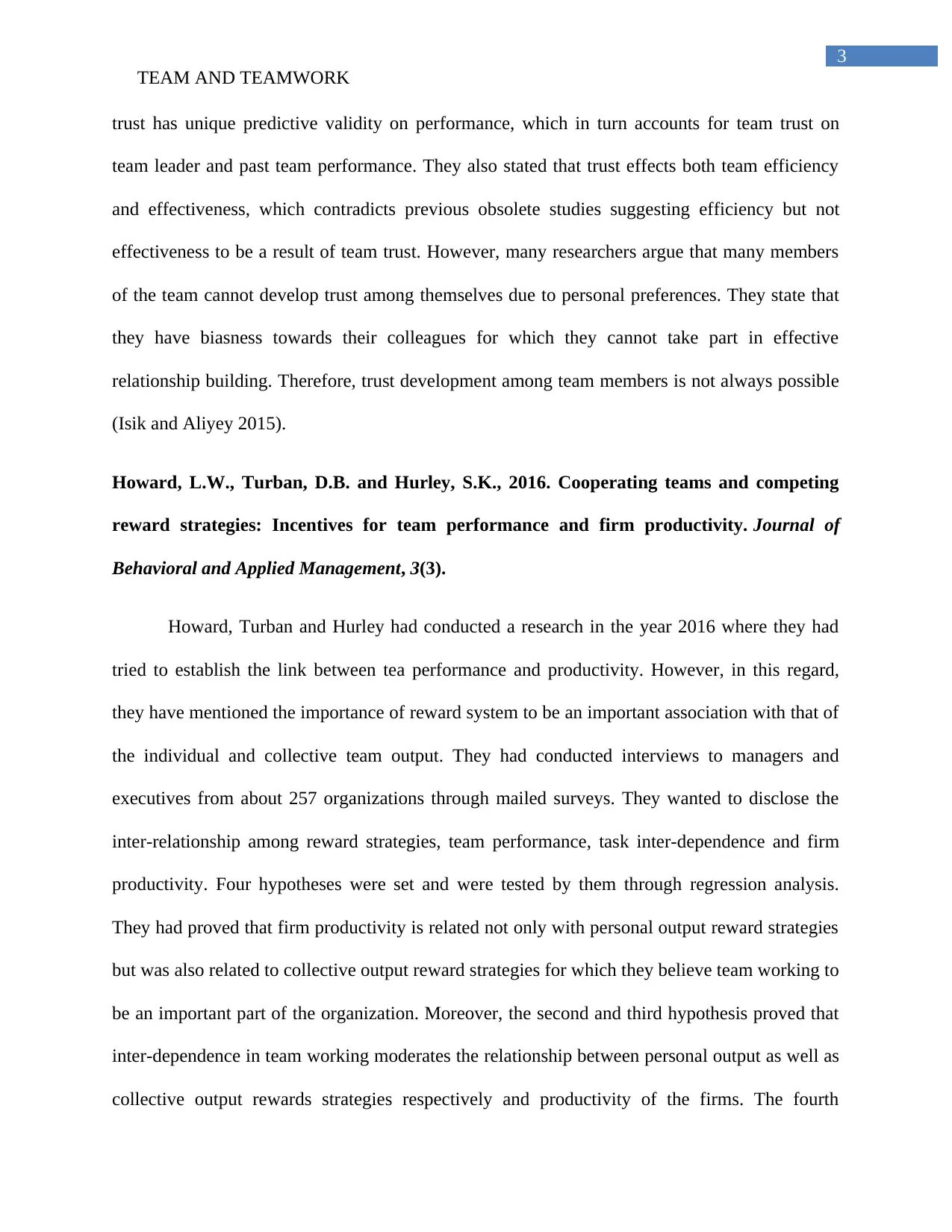
3
TEAM AND TEAMWORK
trust has unique predictive validity on performance, which in turn accounts for team trust on
team leader and past team performance. They also stated that trust effects both team efficiency
and effectiveness, which contradicts previous obsolete studies suggesting efficiency but not
effectiveness to be a result of team trust. However, many researchers argue that many members
of the team cannot develop trust among themselves due to personal preferences. They state that
they have biasness towards their colleagues for which they cannot take part in effective
relationship building. Therefore, trust development among team members is not always possible
(Isik and Aliyey 2015).
Howard, L.W., Turban, D.B. and Hurley, S.K., 2016. Cooperating teams and competing
reward strategies: Incentives for team performance and firm productivity. Journal of
Behavioral and Applied Management, 3(3).
Howard, Turban and Hurley had conducted a research in the year 2016 where they had
tried to establish the link between tea performance and productivity. However, in this regard,
they have mentioned the importance of reward system to be an important association with that of
the individual and collective team output. They had conducted interviews to managers and
executives from about 257 organizations through mailed surveys. They wanted to disclose the
inter-relationship among reward strategies, team performance, task inter-dependence and firm
productivity. Four hypotheses were set and were tested by them through regression analysis.
They had proved that firm productivity is related not only with personal output reward strategies
but was also related to collective output reward strategies for which they believe team working to
be an important part of the organization. Moreover, the second and third hypothesis proved that
inter-dependence in team working moderates the relationship between personal output as well as
collective output rewards strategies respectively and productivity of the firms. The fourth
TEAM AND TEAMWORK
trust has unique predictive validity on performance, which in turn accounts for team trust on
team leader and past team performance. They also stated that trust effects both team efficiency
and effectiveness, which contradicts previous obsolete studies suggesting efficiency but not
effectiveness to be a result of team trust. However, many researchers argue that many members
of the team cannot develop trust among themselves due to personal preferences. They state that
they have biasness towards their colleagues for which they cannot take part in effective
relationship building. Therefore, trust development among team members is not always possible
(Isik and Aliyey 2015).
Howard, L.W., Turban, D.B. and Hurley, S.K., 2016. Cooperating teams and competing
reward strategies: Incentives for team performance and firm productivity. Journal of
Behavioral and Applied Management, 3(3).
Howard, Turban and Hurley had conducted a research in the year 2016 where they had
tried to establish the link between tea performance and productivity. However, in this regard,
they have mentioned the importance of reward system to be an important association with that of
the individual and collective team output. They had conducted interviews to managers and
executives from about 257 organizations through mailed surveys. They wanted to disclose the
inter-relationship among reward strategies, team performance, task inter-dependence and firm
productivity. Four hypotheses were set and were tested by them through regression analysis.
They had proved that firm productivity is related not only with personal output reward strategies
but was also related to collective output reward strategies for which they believe team working to
be an important part of the organization. Moreover, the second and third hypothesis proved that
inter-dependence in team working moderates the relationship between personal output as well as
collective output rewards strategies respectively and productivity of the firms. The fourth
Paraphrase This Document
Need a fresh take? Get an instant paraphrase of this document with our AI Paraphraser
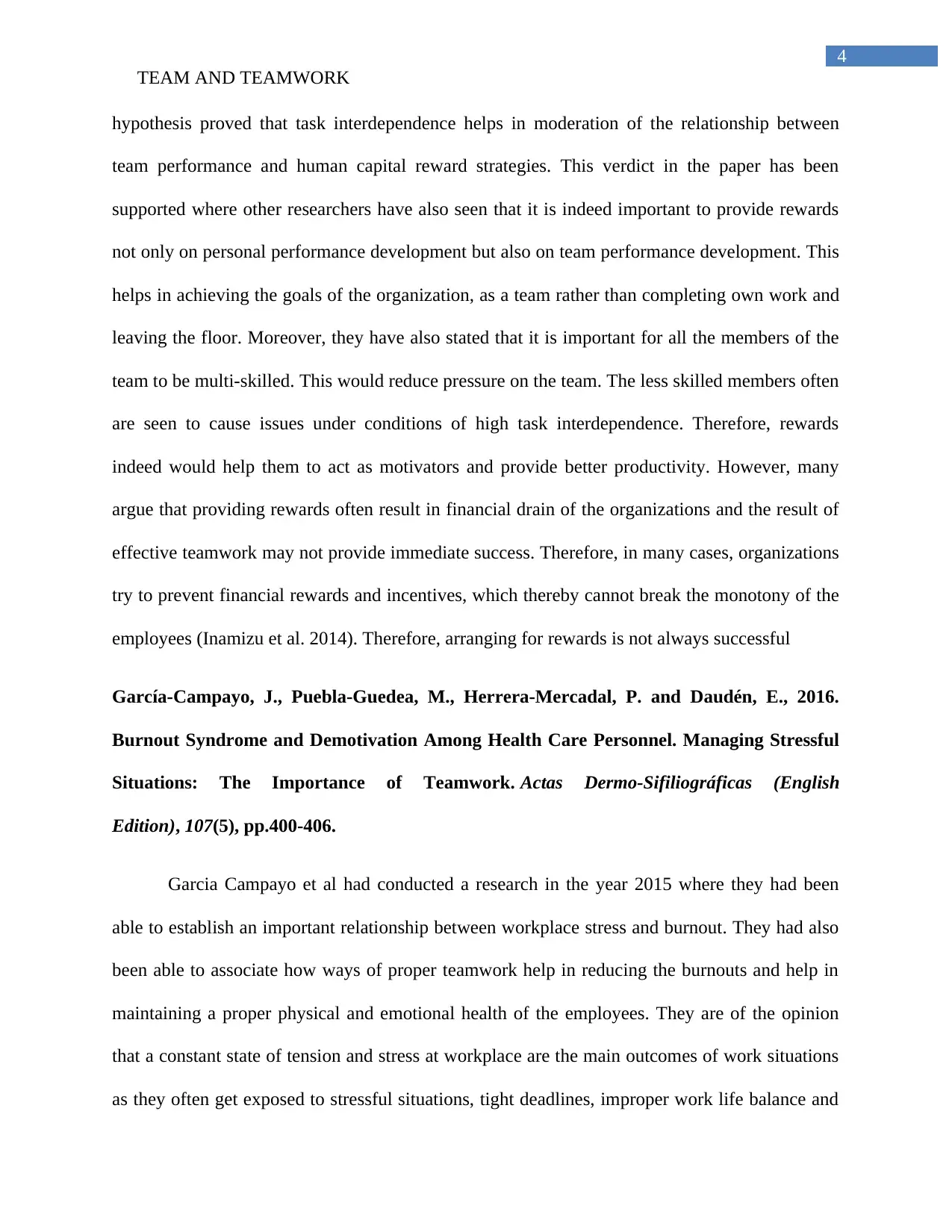
4
TEAM AND TEAMWORK
hypothesis proved that task interdependence helps in moderation of the relationship between
team performance and human capital reward strategies. This verdict in the paper has been
supported where other researchers have also seen that it is indeed important to provide rewards
not only on personal performance development but also on team performance development. This
helps in achieving the goals of the organization, as a team rather than completing own work and
leaving the floor. Moreover, they have also stated that it is important for all the members of the
team to be multi-skilled. This would reduce pressure on the team. The less skilled members often
are seen to cause issues under conditions of high task interdependence. Therefore, rewards
indeed would help them to act as motivators and provide better productivity. However, many
argue that providing rewards often result in financial drain of the organizations and the result of
effective teamwork may not provide immediate success. Therefore, in many cases, organizations
try to prevent financial rewards and incentives, which thereby cannot break the monotony of the
employees (Inamizu et al. 2014). Therefore, arranging for rewards is not always successful
García-Campayo, J., Puebla-Guedea, M., Herrera-Mercadal, P. and Daudén, E., 2016.
Burnout Syndrome and Demotivation Among Health Care Personnel. Managing Stressful
Situations: The Importance of Teamwork. Actas Dermo-Sifiliográficas (English
Edition), 107(5), pp.400-406.
Garcia Campayo et al had conducted a research in the year 2015 where they had been
able to establish an important relationship between workplace stress and burnout. They had also
been able to associate how ways of proper teamwork help in reducing the burnouts and help in
maintaining a proper physical and emotional health of the employees. They are of the opinion
that a constant state of tension and stress at workplace are the main outcomes of work situations
as they often get exposed to stressful situations, tight deadlines, improper work life balance and
TEAM AND TEAMWORK
hypothesis proved that task interdependence helps in moderation of the relationship between
team performance and human capital reward strategies. This verdict in the paper has been
supported where other researchers have also seen that it is indeed important to provide rewards
not only on personal performance development but also on team performance development. This
helps in achieving the goals of the organization, as a team rather than completing own work and
leaving the floor. Moreover, they have also stated that it is important for all the members of the
team to be multi-skilled. This would reduce pressure on the team. The less skilled members often
are seen to cause issues under conditions of high task interdependence. Therefore, rewards
indeed would help them to act as motivators and provide better productivity. However, many
argue that providing rewards often result in financial drain of the organizations and the result of
effective teamwork may not provide immediate success. Therefore, in many cases, organizations
try to prevent financial rewards and incentives, which thereby cannot break the monotony of the
employees (Inamizu et al. 2014). Therefore, arranging for rewards is not always successful
García-Campayo, J., Puebla-Guedea, M., Herrera-Mercadal, P. and Daudén, E., 2016.
Burnout Syndrome and Demotivation Among Health Care Personnel. Managing Stressful
Situations: The Importance of Teamwork. Actas Dermo-Sifiliográficas (English
Edition), 107(5), pp.400-406.
Garcia Campayo et al had conducted a research in the year 2015 where they had been
able to establish an important relationship between workplace stress and burnout. They had also
been able to associate how ways of proper teamwork help in reducing the burnouts and help in
maintaining a proper physical and emotional health of the employees. They are of the opinion
that a constant state of tension and stress at workplace are the main outcomes of work situations
as they often get exposed to stressful situations, tight deadlines, improper work life balance and
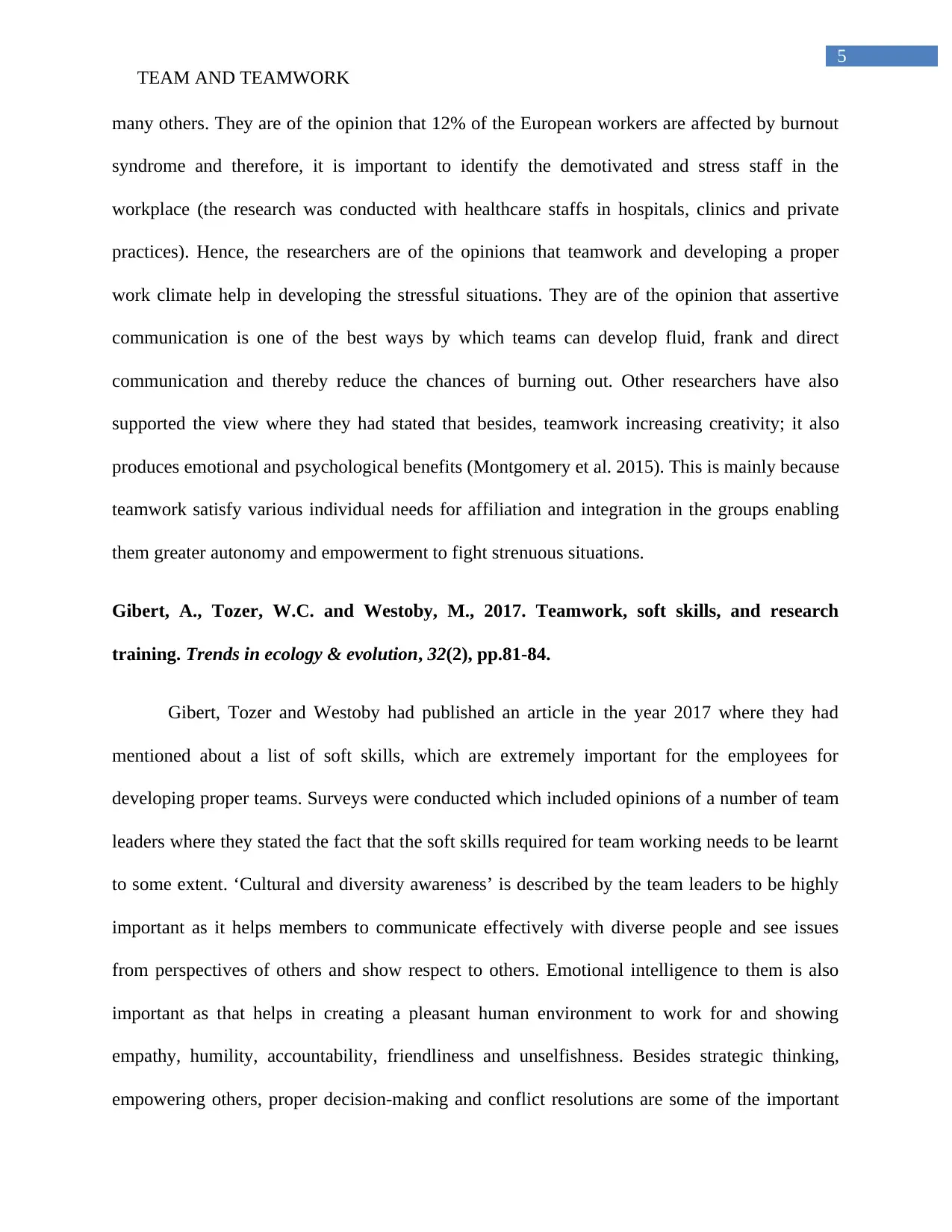
5
TEAM AND TEAMWORK
many others. They are of the opinion that 12% of the European workers are affected by burnout
syndrome and therefore, it is important to identify the demotivated and stress staff in the
workplace (the research was conducted with healthcare staffs in hospitals, clinics and private
practices). Hence, the researchers are of the opinions that teamwork and developing a proper
work climate help in developing the stressful situations. They are of the opinion that assertive
communication is one of the best ways by which teams can develop fluid, frank and direct
communication and thereby reduce the chances of burning out. Other researchers have also
supported the view where they had stated that besides, teamwork increasing creativity; it also
produces emotional and psychological benefits (Montgomery et al. 2015). This is mainly because
teamwork satisfy various individual needs for affiliation and integration in the groups enabling
them greater autonomy and empowerment to fight strenuous situations.
Gibert, A., Tozer, W.C. and Westoby, M., 2017. Teamwork, soft skills, and research
training. Trends in ecology & evolution, 32(2), pp.81-84.
Gibert, Tozer and Westoby had published an article in the year 2017 where they had
mentioned about a list of soft skills, which are extremely important for the employees for
developing proper teams. Surveys were conducted which included opinions of a number of team
leaders where they stated the fact that the soft skills required for team working needs to be learnt
to some extent. ‘Cultural and diversity awareness’ is described by the team leaders to be highly
important as it helps members to communicate effectively with diverse people and see issues
from perspectives of others and show respect to others. Emotional intelligence to them is also
important as that helps in creating a pleasant human environment to work for and showing
empathy, humility, accountability, friendliness and unselfishness. Besides strategic thinking,
empowering others, proper decision-making and conflict resolutions are some of the important
TEAM AND TEAMWORK
many others. They are of the opinion that 12% of the European workers are affected by burnout
syndrome and therefore, it is important to identify the demotivated and stress staff in the
workplace (the research was conducted with healthcare staffs in hospitals, clinics and private
practices). Hence, the researchers are of the opinions that teamwork and developing a proper
work climate help in developing the stressful situations. They are of the opinion that assertive
communication is one of the best ways by which teams can develop fluid, frank and direct
communication and thereby reduce the chances of burning out. Other researchers have also
supported the view where they had stated that besides, teamwork increasing creativity; it also
produces emotional and psychological benefits (Montgomery et al. 2015). This is mainly because
teamwork satisfy various individual needs for affiliation and integration in the groups enabling
them greater autonomy and empowerment to fight strenuous situations.
Gibert, A., Tozer, W.C. and Westoby, M., 2017. Teamwork, soft skills, and research
training. Trends in ecology & evolution, 32(2), pp.81-84.
Gibert, Tozer and Westoby had published an article in the year 2017 where they had
mentioned about a list of soft skills, which are extremely important for the employees for
developing proper teams. Surveys were conducted which included opinions of a number of team
leaders where they stated the fact that the soft skills required for team working needs to be learnt
to some extent. ‘Cultural and diversity awareness’ is described by the team leaders to be highly
important as it helps members to communicate effectively with diverse people and see issues
from perspectives of others and show respect to others. Emotional intelligence to them is also
important as that helps in creating a pleasant human environment to work for and showing
empathy, humility, accountability, friendliness and unselfishness. Besides strategic thinking,
empowering others, proper decision-making and conflict resolutions are some of the important
⊘ This is a preview!⊘
Do you want full access?
Subscribe today to unlock all pages.

Trusted by 1+ million students worldwide
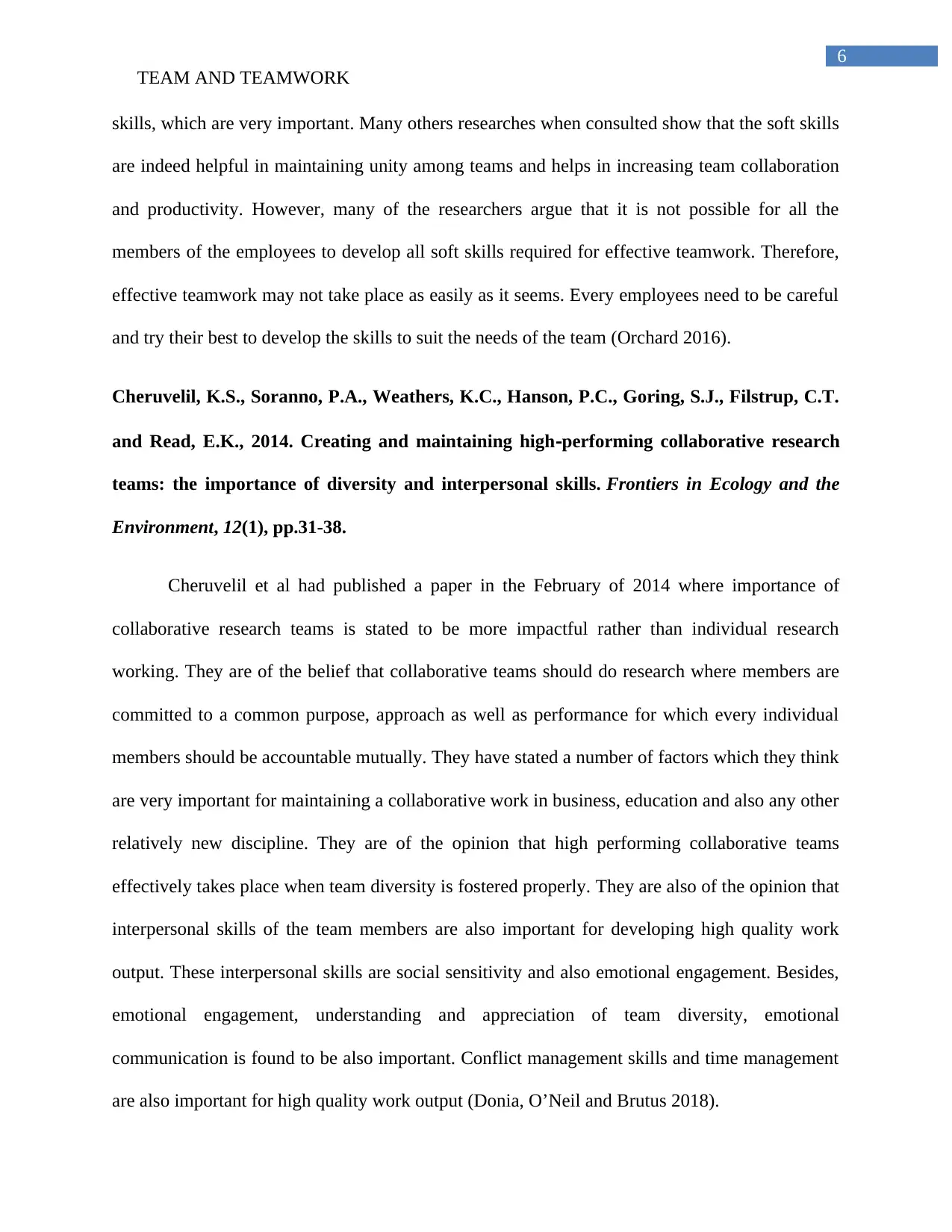
6
TEAM AND TEAMWORK
skills, which are very important. Many others researches when consulted show that the soft skills
are indeed helpful in maintaining unity among teams and helps in increasing team collaboration
and productivity. However, many of the researchers argue that it is not possible for all the
members of the employees to develop all soft skills required for effective teamwork. Therefore,
effective teamwork may not take place as easily as it seems. Every employees need to be careful
and try their best to develop the skills to suit the needs of the team (Orchard 2016).
Cheruvelil, K.S., Soranno, P.A., Weathers, K.C., Hanson, P.C., Goring, S.J., Filstrup, C.T.
and Read, E.K., 2014. Creating and maintaining high‐performing collaborative research
teams: the importance of diversity and interpersonal skills. Frontiers in Ecology and the
Environment, 12(1), pp.31-38.
Cheruvelil et al had published a paper in the February of 2014 where importance of
collaborative research teams is stated to be more impactful rather than individual research
working. They are of the belief that collaborative teams should do research where members are
committed to a common purpose, approach as well as performance for which every individual
members should be accountable mutually. They have stated a number of factors which they think
are very important for maintaining a collaborative work in business, education and also any other
relatively new discipline. They are of the opinion that high performing collaborative teams
effectively takes place when team diversity is fostered properly. They are also of the opinion that
interpersonal skills of the team members are also important for developing high quality work
output. These interpersonal skills are social sensitivity and also emotional engagement. Besides,
emotional engagement, understanding and appreciation of team diversity, emotional
communication is found to be also important. Conflict management skills and time management
are also important for high quality work output (Donia, O’Neil and Brutus 2018).
TEAM AND TEAMWORK
skills, which are very important. Many others researches when consulted show that the soft skills
are indeed helpful in maintaining unity among teams and helps in increasing team collaboration
and productivity. However, many of the researchers argue that it is not possible for all the
members of the employees to develop all soft skills required for effective teamwork. Therefore,
effective teamwork may not take place as easily as it seems. Every employees need to be careful
and try their best to develop the skills to suit the needs of the team (Orchard 2016).
Cheruvelil, K.S., Soranno, P.A., Weathers, K.C., Hanson, P.C., Goring, S.J., Filstrup, C.T.
and Read, E.K., 2014. Creating and maintaining high‐performing collaborative research
teams: the importance of diversity and interpersonal skills. Frontiers in Ecology and the
Environment, 12(1), pp.31-38.
Cheruvelil et al had published a paper in the February of 2014 where importance of
collaborative research teams is stated to be more impactful rather than individual research
working. They are of the belief that collaborative teams should do research where members are
committed to a common purpose, approach as well as performance for which every individual
members should be accountable mutually. They have stated a number of factors which they think
are very important for maintaining a collaborative work in business, education and also any other
relatively new discipline. They are of the opinion that high performing collaborative teams
effectively takes place when team diversity is fostered properly. They are also of the opinion that
interpersonal skills of the team members are also important for developing high quality work
output. These interpersonal skills are social sensitivity and also emotional engagement. Besides,
emotional engagement, understanding and appreciation of team diversity, emotional
communication is found to be also important. Conflict management skills and time management
are also important for high quality work output (Donia, O’Neil and Brutus 2018).
Paraphrase This Document
Need a fresh take? Get an instant paraphrase of this document with our AI Paraphraser
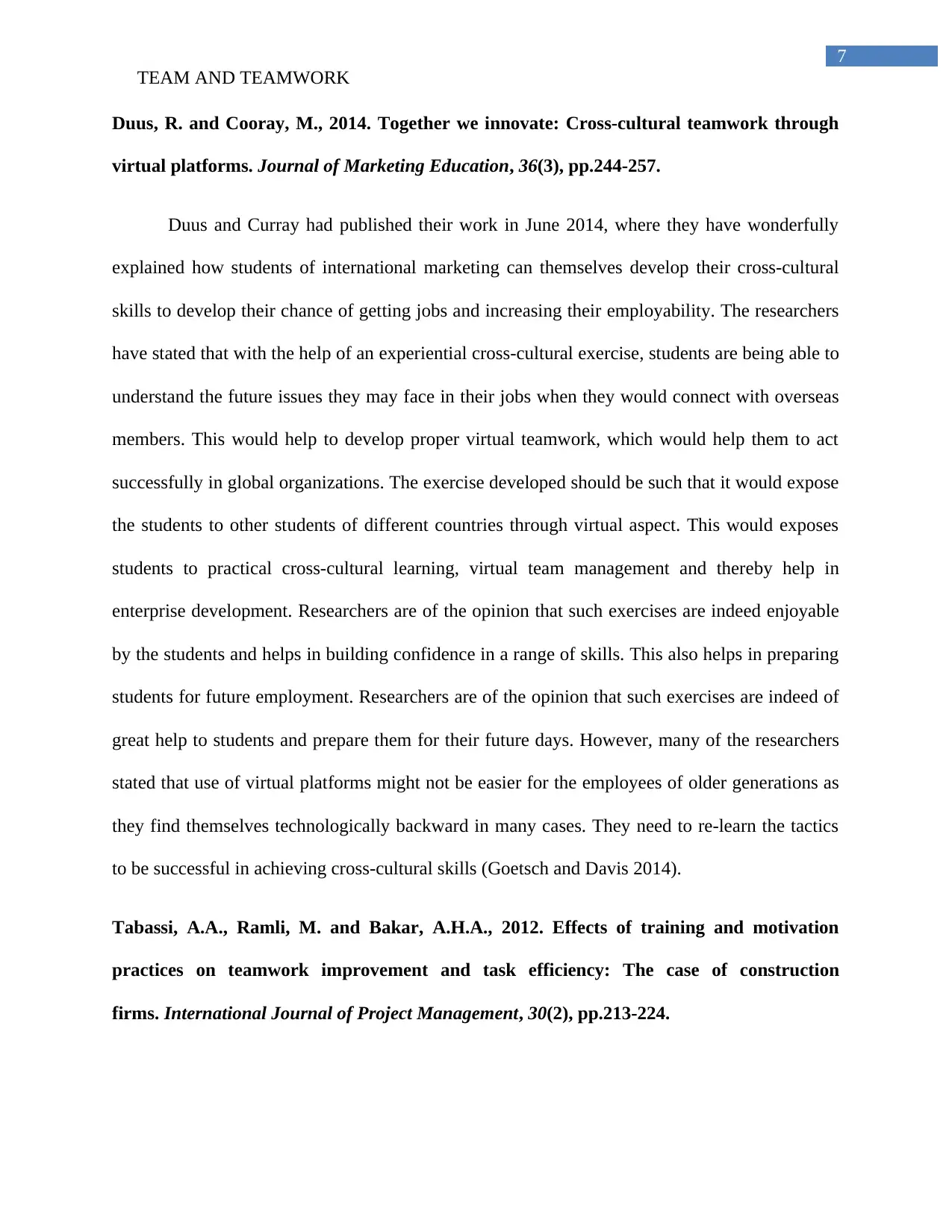
7
TEAM AND TEAMWORK
Duus, R. and Cooray, M., 2014. Together we innovate: Cross-cultural teamwork through
virtual platforms. Journal of Marketing Education, 36(3), pp.244-257.
Duus and Curray had published their work in June 2014, where they have wonderfully
explained how students of international marketing can themselves develop their cross-cultural
skills to develop their chance of getting jobs and increasing their employability. The researchers
have stated that with the help of an experiential cross-cultural exercise, students are being able to
understand the future issues they may face in their jobs when they would connect with overseas
members. This would help to develop proper virtual teamwork, which would help them to act
successfully in global organizations. The exercise developed should be such that it would expose
the students to other students of different countries through virtual aspect. This would exposes
students to practical cross-cultural learning, virtual team management and thereby help in
enterprise development. Researchers are of the opinion that such exercises are indeed enjoyable
by the students and helps in building confidence in a range of skills. This also helps in preparing
students for future employment. Researchers are of the opinion that such exercises are indeed of
great help to students and prepare them for their future days. However, many of the researchers
stated that use of virtual platforms might not be easier for the employees of older generations as
they find themselves technologically backward in many cases. They need to re-learn the tactics
to be successful in achieving cross-cultural skills (Goetsch and Davis 2014).
Tabassi, A.A., Ramli, M. and Bakar, A.H.A., 2012. Effects of training and motivation
practices on teamwork improvement and task efficiency: The case of construction
firms. International Journal of Project Management, 30(2), pp.213-224.
TEAM AND TEAMWORK
Duus, R. and Cooray, M., 2014. Together we innovate: Cross-cultural teamwork through
virtual platforms. Journal of Marketing Education, 36(3), pp.244-257.
Duus and Curray had published their work in June 2014, where they have wonderfully
explained how students of international marketing can themselves develop their cross-cultural
skills to develop their chance of getting jobs and increasing their employability. The researchers
have stated that with the help of an experiential cross-cultural exercise, students are being able to
understand the future issues they may face in their jobs when they would connect with overseas
members. This would help to develop proper virtual teamwork, which would help them to act
successfully in global organizations. The exercise developed should be such that it would expose
the students to other students of different countries through virtual aspect. This would exposes
students to practical cross-cultural learning, virtual team management and thereby help in
enterprise development. Researchers are of the opinion that such exercises are indeed enjoyable
by the students and helps in building confidence in a range of skills. This also helps in preparing
students for future employment. Researchers are of the opinion that such exercises are indeed of
great help to students and prepare them for their future days. However, many of the researchers
stated that use of virtual platforms might not be easier for the employees of older generations as
they find themselves technologically backward in many cases. They need to re-learn the tactics
to be successful in achieving cross-cultural skills (Goetsch and Davis 2014).
Tabassi, A.A., Ramli, M. and Bakar, A.H.A., 2012. Effects of training and motivation
practices on teamwork improvement and task efficiency: The case of construction
firms. International Journal of Project Management, 30(2), pp.213-224.
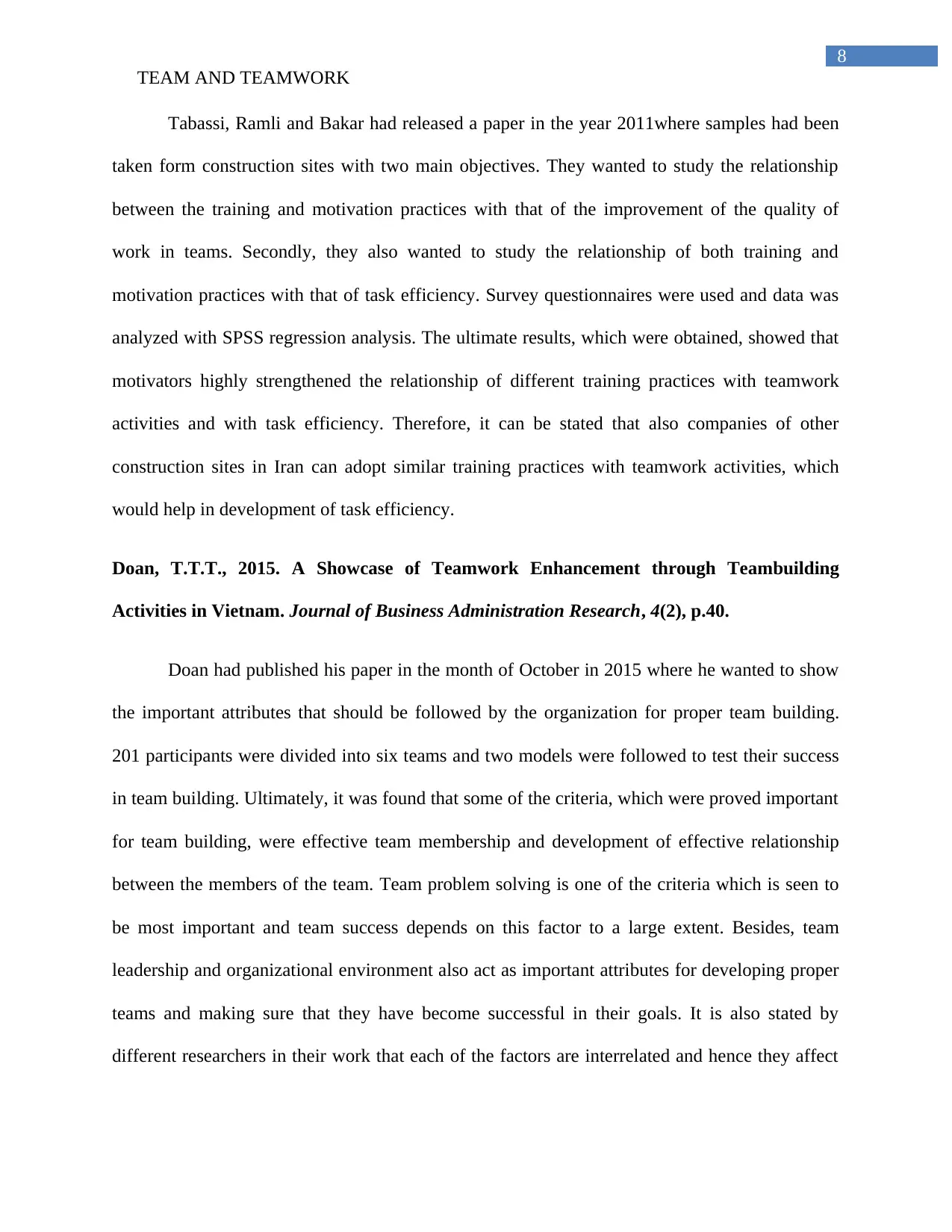
8
TEAM AND TEAMWORK
Tabassi, Ramli and Bakar had released a paper in the year 2011where samples had been
taken form construction sites with two main objectives. They wanted to study the relationship
between the training and motivation practices with that of the improvement of the quality of
work in teams. Secondly, they also wanted to study the relationship of both training and
motivation practices with that of task efficiency. Survey questionnaires were used and data was
analyzed with SPSS regression analysis. The ultimate results, which were obtained, showed that
motivators highly strengthened the relationship of different training practices with teamwork
activities and with task efficiency. Therefore, it can be stated that also companies of other
construction sites in Iran can adopt similar training practices with teamwork activities, which
would help in development of task efficiency.
Doan, T.T.T., 2015. A Showcase of Teamwork Enhancement through Teambuilding
Activities in Vietnam. Journal of Business Administration Research, 4(2), p.40.
Doan had published his paper in the month of October in 2015 where he wanted to show
the important attributes that should be followed by the organization for proper team building.
201 participants were divided into six teams and two models were followed to test their success
in team building. Ultimately, it was found that some of the criteria, which were proved important
for team building, were effective team membership and development of effective relationship
between the members of the team. Team problem solving is one of the criteria which is seen to
be most important and team success depends on this factor to a large extent. Besides, team
leadership and organizational environment also act as important attributes for developing proper
teams and making sure that they have become successful in their goals. It is also stated by
different researchers in their work that each of the factors are interrelated and hence they affect
TEAM AND TEAMWORK
Tabassi, Ramli and Bakar had released a paper in the year 2011where samples had been
taken form construction sites with two main objectives. They wanted to study the relationship
between the training and motivation practices with that of the improvement of the quality of
work in teams. Secondly, they also wanted to study the relationship of both training and
motivation practices with that of task efficiency. Survey questionnaires were used and data was
analyzed with SPSS regression analysis. The ultimate results, which were obtained, showed that
motivators highly strengthened the relationship of different training practices with teamwork
activities and with task efficiency. Therefore, it can be stated that also companies of other
construction sites in Iran can adopt similar training practices with teamwork activities, which
would help in development of task efficiency.
Doan, T.T.T., 2015. A Showcase of Teamwork Enhancement through Teambuilding
Activities in Vietnam. Journal of Business Administration Research, 4(2), p.40.
Doan had published his paper in the month of October in 2015 where he wanted to show
the important attributes that should be followed by the organization for proper team building.
201 participants were divided into six teams and two models were followed to test their success
in team building. Ultimately, it was found that some of the criteria, which were proved important
for team building, were effective team membership and development of effective relationship
between the members of the team. Team problem solving is one of the criteria which is seen to
be most important and team success depends on this factor to a large extent. Besides, team
leadership and organizational environment also act as important attributes for developing proper
teams and making sure that they have become successful in their goals. It is also stated by
different researchers in their work that each of the factors are interrelated and hence they affect
⊘ This is a preview!⊘
Do you want full access?
Subscribe today to unlock all pages.

Trusted by 1+ million students worldwide
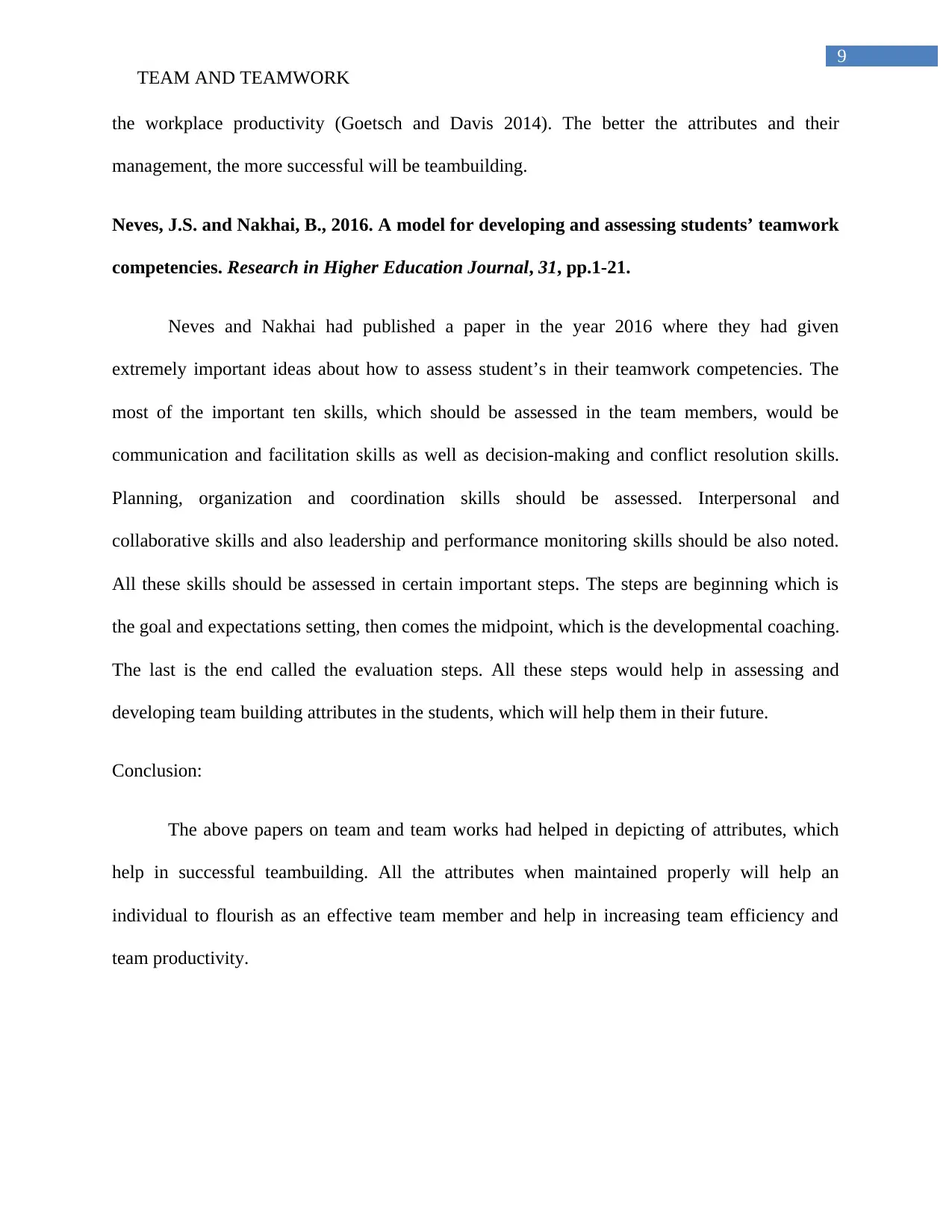
9
TEAM AND TEAMWORK
the workplace productivity (Goetsch and Davis 2014). The better the attributes and their
management, the more successful will be teambuilding.
Neves, J.S. and Nakhai, B., 2016. A model for developing and assessing students’ teamwork
competencies. Research in Higher Education Journal, 31, pp.1-21.
Neves and Nakhai had published a paper in the year 2016 where they had given
extremely important ideas about how to assess student’s in their teamwork competencies. The
most of the important ten skills, which should be assessed in the team members, would be
communication and facilitation skills as well as decision-making and conflict resolution skills.
Planning, organization and coordination skills should be assessed. Interpersonal and
collaborative skills and also leadership and performance monitoring skills should be also noted.
All these skills should be assessed in certain important steps. The steps are beginning which is
the goal and expectations setting, then comes the midpoint, which is the developmental coaching.
The last is the end called the evaluation steps. All these steps would help in assessing and
developing team building attributes in the students, which will help them in their future.
Conclusion:
The above papers on team and team works had helped in depicting of attributes, which
help in successful teambuilding. All the attributes when maintained properly will help an
individual to flourish as an effective team member and help in increasing team efficiency and
team productivity.
TEAM AND TEAMWORK
the workplace productivity (Goetsch and Davis 2014). The better the attributes and their
management, the more successful will be teambuilding.
Neves, J.S. and Nakhai, B., 2016. A model for developing and assessing students’ teamwork
competencies. Research in Higher Education Journal, 31, pp.1-21.
Neves and Nakhai had published a paper in the year 2016 where they had given
extremely important ideas about how to assess student’s in their teamwork competencies. The
most of the important ten skills, which should be assessed in the team members, would be
communication and facilitation skills as well as decision-making and conflict resolution skills.
Planning, organization and coordination skills should be assessed. Interpersonal and
collaborative skills and also leadership and performance monitoring skills should be also noted.
All these skills should be assessed in certain important steps. The steps are beginning which is
the goal and expectations setting, then comes the midpoint, which is the developmental coaching.
The last is the end called the evaluation steps. All these steps would help in assessing and
developing team building attributes in the students, which will help them in their future.
Conclusion:
The above papers on team and team works had helped in depicting of attributes, which
help in successful teambuilding. All the attributes when maintained properly will help an
individual to flourish as an effective team member and help in increasing team efficiency and
team productivity.
Paraphrase This Document
Need a fresh take? Get an instant paraphrase of this document with our AI Paraphraser
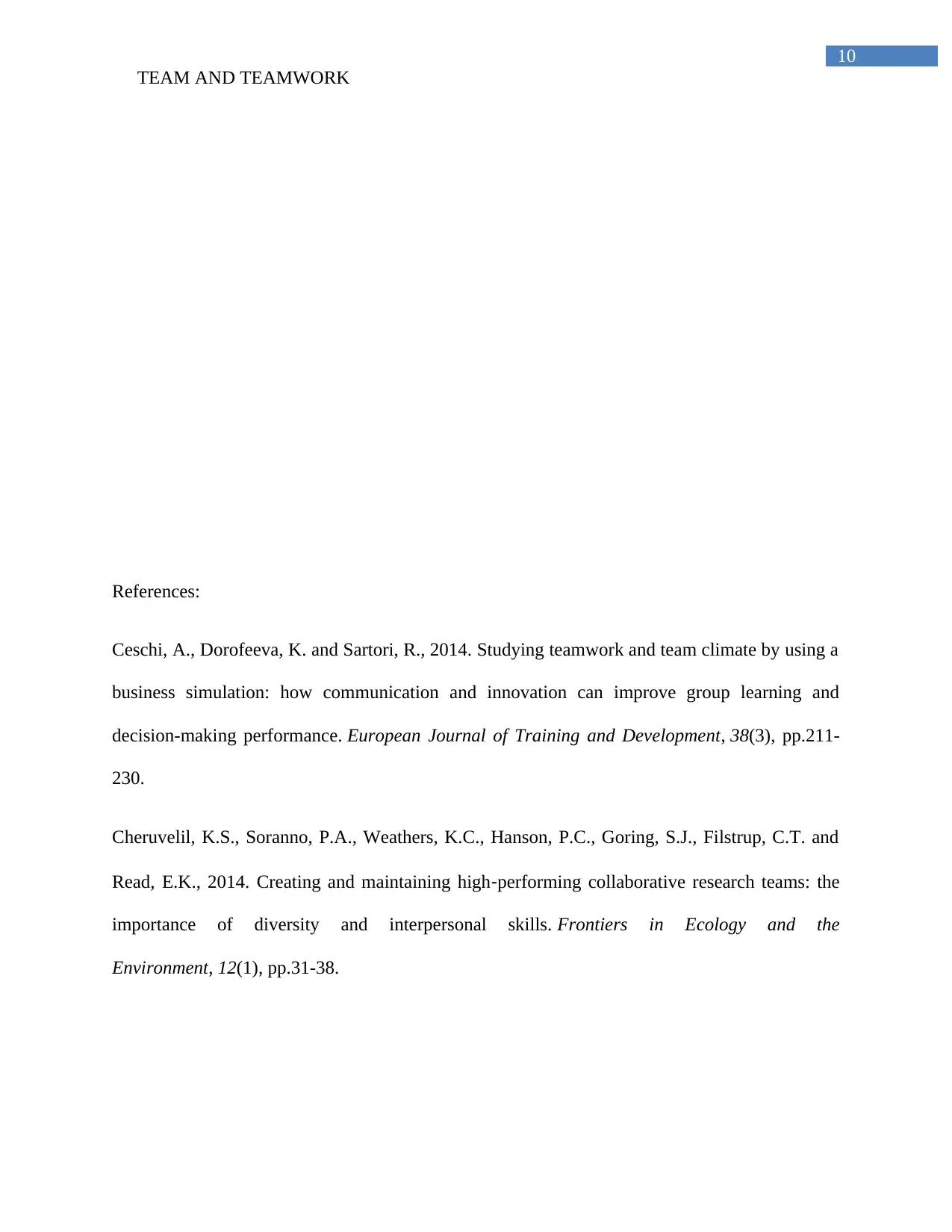
10
TEAM AND TEAMWORK
References:
Ceschi, A., Dorofeeva, K. and Sartori, R., 2014. Studying teamwork and team climate by using a
business simulation: how communication and innovation can improve group learning and
decision-making performance. European Journal of Training and Development, 38(3), pp.211-
230.
Cheruvelil, K.S., Soranno, P.A., Weathers, K.C., Hanson, P.C., Goring, S.J., Filstrup, C.T. and
Read, E.K., 2014. Creating and maintaining high‐performing collaborative research teams: the
importance of diversity and interpersonal skills. Frontiers in Ecology and the
Environment, 12(1), pp.31-38.
TEAM AND TEAMWORK
References:
Ceschi, A., Dorofeeva, K. and Sartori, R., 2014. Studying teamwork and team climate by using a
business simulation: how communication and innovation can improve group learning and
decision-making performance. European Journal of Training and Development, 38(3), pp.211-
230.
Cheruvelil, K.S., Soranno, P.A., Weathers, K.C., Hanson, P.C., Goring, S.J., Filstrup, C.T. and
Read, E.K., 2014. Creating and maintaining high‐performing collaborative research teams: the
importance of diversity and interpersonal skills. Frontiers in Ecology and the
Environment, 12(1), pp.31-38.
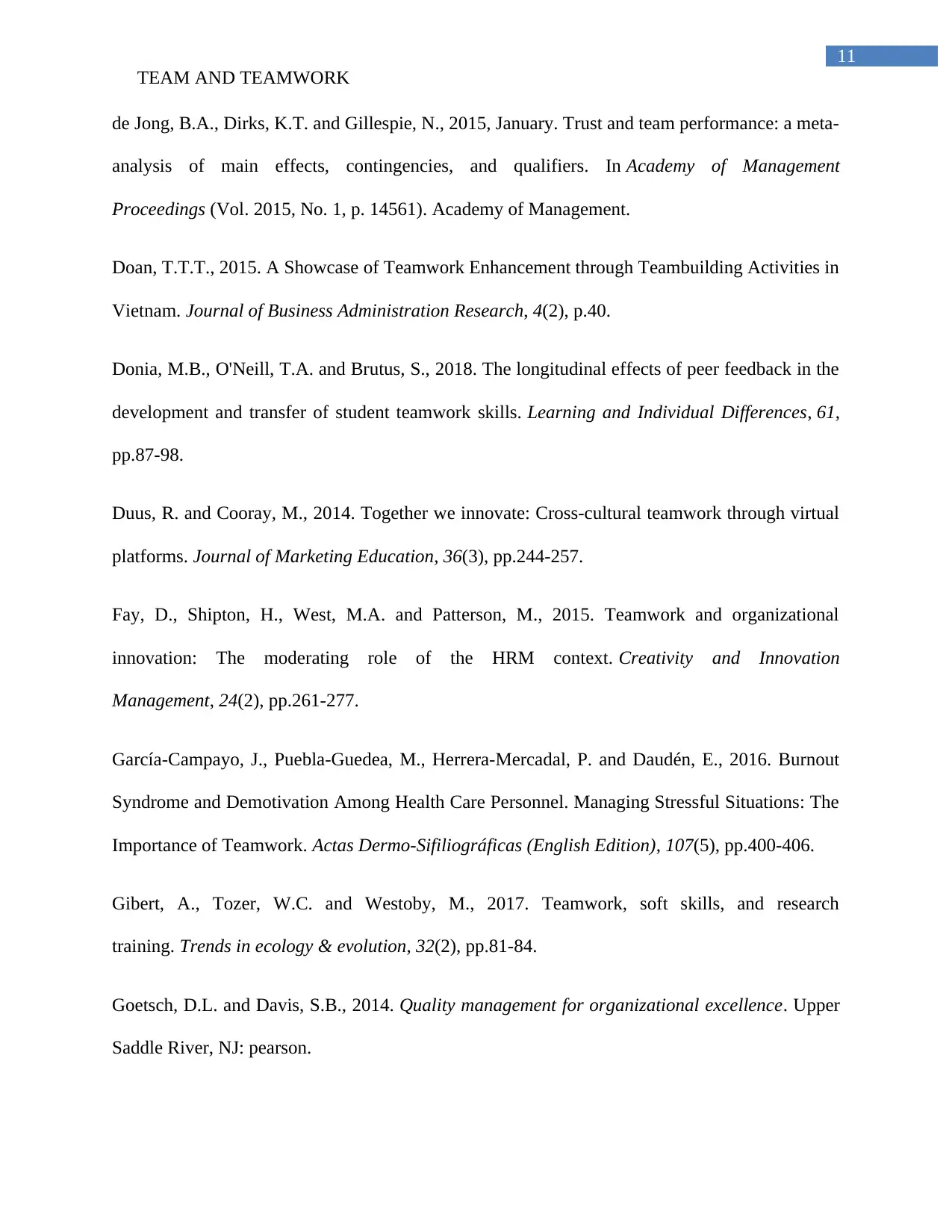
11
TEAM AND TEAMWORK
de Jong, B.A., Dirks, K.T. and Gillespie, N., 2015, January. Trust and team performance: a meta-
analysis of main effects, contingencies, and qualifiers. In Academy of Management
Proceedings (Vol. 2015, No. 1, p. 14561). Academy of Management.
Doan, T.T.T., 2015. A Showcase of Teamwork Enhancement through Teambuilding Activities in
Vietnam. Journal of Business Administration Research, 4(2), p.40.
Donia, M.B., O'Neill, T.A. and Brutus, S., 2018. The longitudinal effects of peer feedback in the
development and transfer of student teamwork skills. Learning and Individual Differences, 61,
pp.87-98.
Duus, R. and Cooray, M., 2014. Together we innovate: Cross-cultural teamwork through virtual
platforms. Journal of Marketing Education, 36(3), pp.244-257.
Fay, D., Shipton, H., West, M.A. and Patterson, M., 2015. Teamwork and organizational
innovation: The moderating role of the HRM context. Creativity and Innovation
Management, 24(2), pp.261-277.
García-Campayo, J., Puebla-Guedea, M., Herrera-Mercadal, P. and Daudén, E., 2016. Burnout
Syndrome and Demotivation Among Health Care Personnel. Managing Stressful Situations: The
Importance of Teamwork. Actas Dermo-Sifiliográficas (English Edition), 107(5), pp.400-406.
Gibert, A., Tozer, W.C. and Westoby, M., 2017. Teamwork, soft skills, and research
training. Trends in ecology & evolution, 32(2), pp.81-84.
Goetsch, D.L. and Davis, S.B., 2014. Quality management for organizational excellence. Upper
Saddle River, NJ: pearson.
TEAM AND TEAMWORK
de Jong, B.A., Dirks, K.T. and Gillespie, N., 2015, January. Trust and team performance: a meta-
analysis of main effects, contingencies, and qualifiers. In Academy of Management
Proceedings (Vol. 2015, No. 1, p. 14561). Academy of Management.
Doan, T.T.T., 2015. A Showcase of Teamwork Enhancement through Teambuilding Activities in
Vietnam. Journal of Business Administration Research, 4(2), p.40.
Donia, M.B., O'Neill, T.A. and Brutus, S., 2018. The longitudinal effects of peer feedback in the
development and transfer of student teamwork skills. Learning and Individual Differences, 61,
pp.87-98.
Duus, R. and Cooray, M., 2014. Together we innovate: Cross-cultural teamwork through virtual
platforms. Journal of Marketing Education, 36(3), pp.244-257.
Fay, D., Shipton, H., West, M.A. and Patterson, M., 2015. Teamwork and organizational
innovation: The moderating role of the HRM context. Creativity and Innovation
Management, 24(2), pp.261-277.
García-Campayo, J., Puebla-Guedea, M., Herrera-Mercadal, P. and Daudén, E., 2016. Burnout
Syndrome and Demotivation Among Health Care Personnel. Managing Stressful Situations: The
Importance of Teamwork. Actas Dermo-Sifiliográficas (English Edition), 107(5), pp.400-406.
Gibert, A., Tozer, W.C. and Westoby, M., 2017. Teamwork, soft skills, and research
training. Trends in ecology & evolution, 32(2), pp.81-84.
Goetsch, D.L. and Davis, S.B., 2014. Quality management for organizational excellence. Upper
Saddle River, NJ: pearson.
⊘ This is a preview!⊘
Do you want full access?
Subscribe today to unlock all pages.

Trusted by 1+ million students worldwide
1 out of 13
Your All-in-One AI-Powered Toolkit for Academic Success.
+13062052269
info@desklib.com
Available 24*7 on WhatsApp / Email
![[object Object]](/_next/static/media/star-bottom.7253800d.svg)
Unlock your academic potential
Copyright © 2020–2026 A2Z Services. All Rights Reserved. Developed and managed by ZUCOL.

